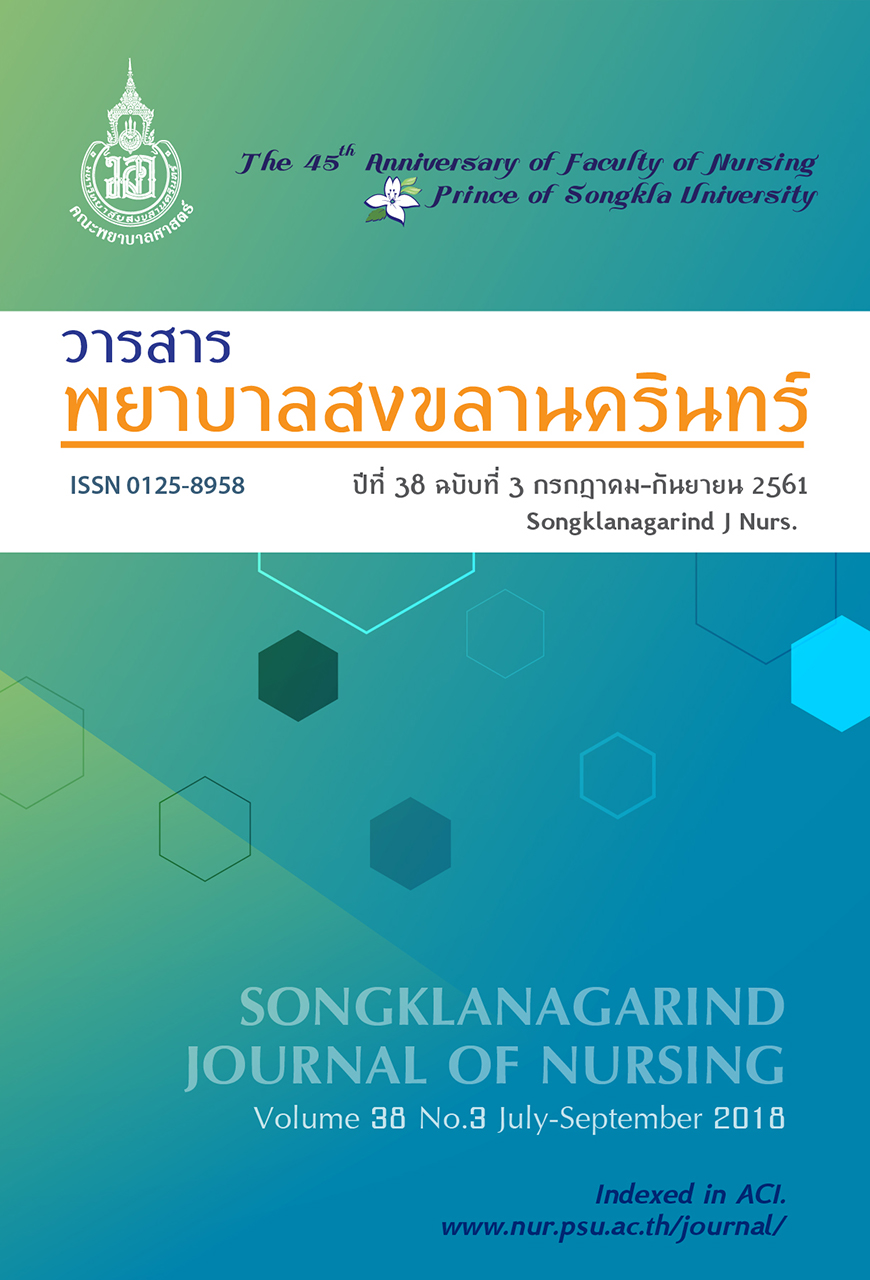Nursing Students’ Perspectives on Authentic Learning in the Course of Nursing Care of Persons with Mental Health Problems
Main Article Content
Abstract
This qualitative research aimed to describe the nursing students’ perspectives on authentic learning
in the course of nursing care of persons with mental health problems. Participants included 41 nursing
students in the third academic year. Data were collected by using in-depth interviews, focus group, and
non-participative observation. Data were analyzed by using the content analysis method. Trustworthiness of a qualitative study was established by using criteria of Morse and Field. Finding of the study showed three
main themes: 1. integration the knowledge, consisted of 3 sub-themes: 1.1) comparing authentic thing with
theory, 1.2) strengthen experience, 1.3) learn how to ask questions; 2. changing their perspectives on psychiatric
patients, consisted of 4 sub-themes: 2.1) psychiatric patient in community was not a scary person, 2.2)
being self-awareness, 2.3) relationship building with psychiatric patients in community and 2.4) understanding
about lifestyle of psychiatric patents in the community; and 3. understanding psychiatric patients in community,
included 2 sub-themes: 3.1) psychiatric symptoms, 3.2) factors influencing psychiatric disorders, and 4.
caring for psychiatric patients in the community. Therefore, nurse instructors should apply the authentic
learning method in other courses to help nursing students to learn more in real situation and integrate
knowledge from theory to practices.
Article Details
References
2. Ganzer AC, Zauderer C. Structured learning and self-reflection: Strategies to decrease anxietyin the psychiatric mental health clinical nursing experience. Nurs Educ Perspect. 2013;34(4):244-47.
3. Kunlaka S, Uraiwan P. Caring for psychiatric patients with the humanized care: Authentic learning in the course of nursing care of people with mental health problems. Rama Nurse Journal. 2013;25(3):93-107. Thai.
4. Stockhausen LJ. Learning to become a nurse: student’s reflections on their clinical experiences. Aus J Adv Nurs. 2005; 22(3): 8-14.
5. Khammani T. Teaching methods for effective learning process. 15 th ed. Bangkok: Dan Sutra Printing Company; 2012. Thai.
6. Suapumee N, Naksrisang W, Singhasem P. Management of experiential learning in nursing education. Nursing Journal of the Ministry of Public Health. 2017;27(1): 12-21. Thai.
7. Manning CV. Learner-centered teaching. Radiologic Science & Education. 2017; 22(2), 23-31.
8. Patton MQ. Qualitative evaluation and research methods. 2 nd ed. United States of America: Sage Publication; 1990.
9. Elo S, Kyngas H. The qualitative content analysis process. Journal of Advanced Nursing. 2008;62(1),107–15 doi: 10.1111/j.1365-2648.2007.04569.x
10. Morse JM, Field PA. Nursing research: The application of qualitative approaches. 2 nd ed. London: Chapman & Hall; 1996.
11. Polit FD, Hungler PB. Nurse research principle and methods. 4 th ed. United States of America: J.B. Lippincott Company; 1991.
12. Merriam BS. Qualitative research in practice: example for discussion and analysis. San Francisco: Jossey-Bass a Wiley Company; 2002.
13. Maneesakorn von Bormann S, Opasawatchai S, Santwanpas. Effects of authentic learning style on data analysis skills and satisfaction of 3rd year nursing students. Nursing Journal of the Ministry of Public Health. 2015; 25(3): 93-107. Thai.


